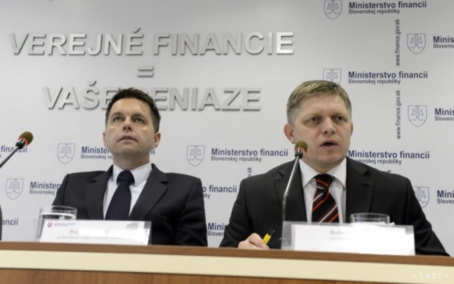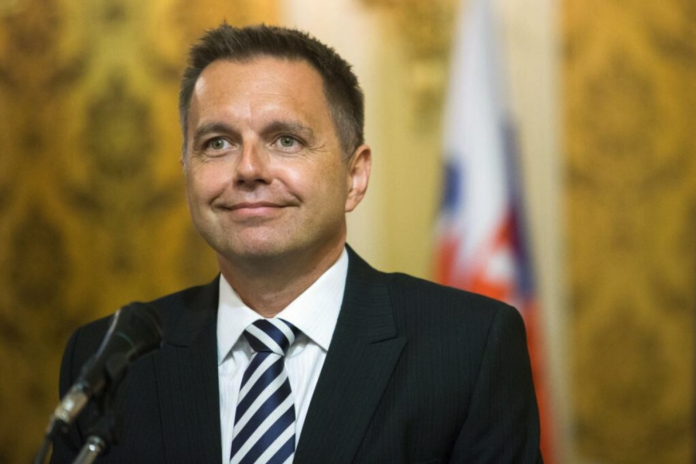The National Bank Governor Peter Kažimír has been linked to the purchase of a €1.5 million Côte d’Azur villa funded by oligarch Jozef Brhel, a key figure in a major Slovak corruption case and a close associate of Prime Minister Robert Fico. The villa, acquired without repayment of the loan, highlights the financial web connecting Fico’s inner circle to questionable transactions. Recent legal reforms by Fico’s government, widely criticised for protecting political allies, have dismissed Kažimír’s bribery charges, prompting concerns that these changes shield his inner circle from accountability.
29 November Update: Kažimír Case Remains Uncertain
The legal proceedings against Peter Kažimír, the National Bank Governor, have been postponed to 9 December 2024. The delay follows a Supreme Court decision clarifying that recent statute of limitations reforms, introduced by the ruling coalition, apply to cases already in progress, except those involving EU financial interests. a final decision on whether Kažimír’s bribery charges will be dismissed or proceed to a verdict is expected on 9 December 2024.
Slovak Prime Minister Robert Fico’s Inner Circle Implicated in Corruption Linked to Luxury French Villa
A complex financial web involving individuals close to Prime Minister Robert Fico, including central bank governor Peter Kažimír and oligarch Jozef Brhel, reveals alleged corruption and misuse of funds leading to the purchase of a French Riviera villa. Documents suggest that funds sourced from Brhel, a key figure in the “Mytnik” corruption case, were used by Kažimír’s partner to acquire the property without repaying a substantial loan, raising serious concerns about corruption within Fico’s inner circle.
Unravelling the Financial Network Around Robert Fico’s Associates
Newly obtained documents from the Cypriot business registry disclose intricate financial transactions involving prominent figures associated with Prime Minister Robert Fico. Central bank governor Peter Kažimír, formerly Finance Minister under Fico’s Smer party, his partner Katarína Korecká, and oligarch Jozef Brhel are at the centre of these dealings. Korecká received a €1.5 million loan from Tyree Trading Limited, a Cypriot shell company financially linked to Brhel.
This loan facilitated the purchase of a luxurious villa with a swimming pool in Vence on the French Riviera. The debt was subsequently written off, and Korecká retained ownership of the villa without repaying the loan. These events transpired between 2013 and 2014, a period marked by the unfolding “Mytnik” corruption scandal involving significant losses to the Slovak state through manipulated IT contracts.
The Oligarch’s Connection to Fico’s Inner Circle
Jozef Brhel, an oligarch closely connected to Robert Fico’s Smer party, transferred €2 million to Tyree Trading Limited in July 2013. Shortly thereafter, €1.5 million was loaned to Korecká’s company, Merey de Taude. Merey de Taude then purchased the French villa, as confirmed by documents analysed in collaboration with the Investigative Centre of Ján Kuciak (ICJK).
Brhel, now on trial for his alleged role in the “Mytnik” case, never sought repayment of the loan. The debt was effectively cancelled through a series of complex transactions involving shell companies, culminating in both debts being offset and written off by the end of 2014.

Implications of the ‘Mytnik’ Corruption Case
The timing of these financial manoeuvres coincides with the “Mytnik” (Toll Collector) corruption case, wherein the Slovak state reportedly lost over €45 million due to overpriced IT contracts awarded to the company Allexis. These contracts were secured through non-transparent processes, bypassing public tenders. The indictment alleges that Brhel profited from these deals via bribery and exerted influence over the Financial Administration.
At the time, Peter Kažimír oversaw the Financial Administration as Finance Minister. Former Financial Administration head František Imrecze, now cooperating with investigators, testified that without Brhel’s influence over Kažimír, Allexis would not have secured the contracts. “Without the influence of Brhel over Kažimír, it would not have been possible,” Imrecze stated.
Kažimír’s Case Dismissed Due to Legal Reforms
In a significant development, Peter Kažimír’s corruption case was ordered to be dismissed a day before his scheduled court hearing. The Slovak Supreme Court issued a unifying decision requiring judges to halt prosecutions affected by shortened statutes of limitations resulting from recent amendments to the criminal code. These amendments, implemented by Robert Fico’s government, have been criticized for being designed to protect members of his inner circle from prosecution.
Kažimír was accused of bribing František Imrecze with €48,000 during his tenure as Finance Minister. Despite persuasive evidence and the prosecutor seeking a prison sentence and a five-year ban from public office, the case will not proceed due to the new legal provisions.
Reforms Shielding Fico’s Associates
The criminal code amendments have also benefited other associates of Robert Fico. Oligarch Miroslav Výboh, a close friend of Fico, had his prosecution halted under similar circumstances. Deputy Speaker of Parliament Peter Žiga, a member of Fico’s affiliated party Hlas, is also expected to benefit, although his case has not yet reached court.
These legislative changes have been condemned by opposition parties and legal experts, who argue that they undermine the rule of law and send a message that corruption among high-ranking officials will go unpunished. Mária Kolíková, an opposition MP and former Justice Minister, stated that the government has allowed “shameful criminal code amendments,” effectively differentiating between protecting the European Union’s financial interests and Slovakia’s own funds.

“It’s a grotesque and disgraceful situation,” Kolíková remarked. “The government is essentially telling people that living honestly in Slovakia does not pay off.”
Impact on Slovakia’s Democratic Integrity
These revelations point to systemic issues of corruption among individuals close to Prime Minister Robert Fico, undermining democratic institutions and the rule of law. The use of offshore companies and erasure of significant debts suggest deliberate attempts to conceal illicit activities and evade scrutiny.
The recent legal reforms further exacerbate concerns, appearing tailored to ensure impunity for Fico’s associates. The dismissal of cases against prominent figures despite substantial evidence undermines public trust in the judicial system and the government’s commitment to combating corruption.
Such actions contradict Slovakia’s commitments as an EU member state to uphold transparency and combat corruption. They also erode public trust in governmental institutions and highlight the need for rigorous oversight and accountability mechanisms.
The Necessity for Transparency and Reform
The case underscores the critical role of investigative journalism and civil society in uncovering corruption and holding powerful figures accountable. It also calls attention to the dangers of disinformation and attacks on the media by officials seeking to deflect criticism.
Strengthening democratic institutions requires a concerted effort to address corruption at all levels, particularly among those in the highest echelons of power. Legal reforms should aim to enhance, not hinder, the prosecution of corrupt officials. Upholding the rule of law is essential to prevent the erosion of democratic values and ensure stability within Slovakia and the broader European community.
Author: Mária Benedikovičová | Source: Denník N
Journalists Confront Robert Fico







